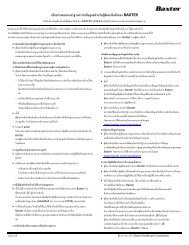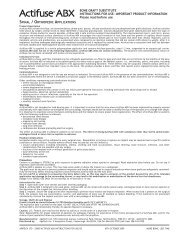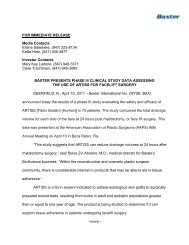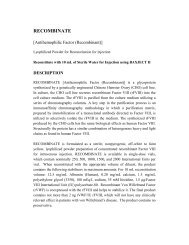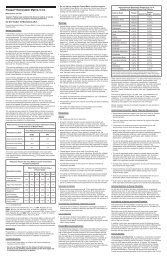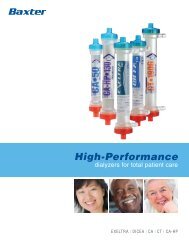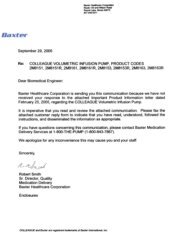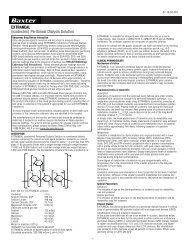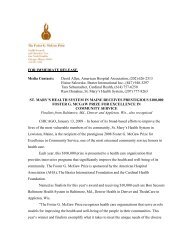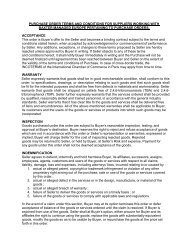4% Icodextrin - Baxter
4% Icodextrin - Baxter
4% Icodextrin - Baxter
You also want an ePaper? Increase the reach of your titles
YUMPU automatically turns print PDFs into web optimized ePapers that Google loves.
Pharmacokinetics of <strong>Icodextrin</strong><br />
Absorption<br />
Absorption of icodextrin from the peritoneal cavity follows zero-order kinetics,<br />
consistent with convective transport via the lymphatic pathways. Studies in<br />
patients undergoing continuous ambulatory peritoneal dialysis (CAPD)<br />
indicate that a median of 40% of the instilled icodextrin was absorbed from<br />
the peritoneal solution during a 12 hour dwell.2<br />
Metabolism and Elimination<br />
When given intraperitoneally, the icodextrin polymer is not metabolized<br />
significantly in the peritoneal cavity but is slowly transferred into the systemic<br />
circulation by peritoneal lymphatic drainage. In the systemic circulation<br />
icodextrin is rapidly metabolized by alpha-amylase to lower molecular weight<br />
oligosaccharides, which along with icodextrin, are eliminated by renal<br />
excretion. The rate of clearance of icodextrin from the systemic circulation<br />
has been estimated to be equal to glomerular filtration rate.<br />
II. INDICATION, CONTRAINDICATIONS, WARNINGS AND<br />
PRECAUTIONS<br />
INDICATION FOR USE<br />
ADEPT ® Adhesion Reduction Solution is indicated for use intraperitoneally as<br />
an adjunct to good surgical technique for the reduction of post-surgical<br />
adhesions in patients undergoing gynecological laparoscopic adhesiolysis.<br />
CONTRAINDICATIONS<br />
ADEPT ® is contraindicated:<br />
• In patients with known or suspected allergy to cornstarch based<br />
polymers e.g. icodextrin, or with maltose or isomaltose intolerance,<br />
or with glycogen storage disease.<br />
• In the presence of frank infection (e.g. peritonitis) in the abdominopelvic<br />
cavity.<br />
• In procedures with laparotomy incision. Serious post-operative wound<br />
complications including dehiscence and cutaneous fistula formation<br />
have been reported from clinical experience outside the US when<br />
ADEPT® was used in surgical cases with laparotomy incision.<br />
• In procedures involving bowel resection or repair, or appendectomy.<br />
Anastomotic failure, ileus and peritonitis following procedures<br />
involving bowel resection and instillation of ADEPT® have been<br />
reported from clinical experience outside of the US.<br />
WARNINGS<br />
• There have been rare reports of sterile peritonitis following the use of<br />
icodextrin. The differential diagnosis of abdomino-pelvic pain following<br />
instillation of ADEPT® should include peritoneal cavity infection,<br />
perforated bowel or other viscous, intraperitoneal bleeding, and other<br />
life threatening post-operative complications in addition to sterile<br />
peritonitis.<br />
• Leaking ADEPT® fluid through laparoscopic port sites post-operatively<br />
is associated with wound complications such as subcutaneous fluid<br />
collection, skin separation and infection. Meticulous closure of fascia<br />
may help reduce wound complications related to fluid extravasation<br />
following gynecologic laparoscopy surgery.<br />
• There have been rare reports of hypersensitivity reactions in patients<br />
treated with ADEPT®. Anaphylaxis has been reported in a few<br />
patients.<br />
• There are rare reports of pulmonary edema, pulmonary effusion and<br />
arrhythmia from clinical experience with ADEPT® outside of the US.<br />
These cases tended to occur in elderly or otherwise debilitated patients<br />
(e.g. cancer patients). The potential benefit of ADEPT® for adhesion<br />
prevention should be carefully weighed against the risk of serious<br />
complications in patients with serious co-morbidities.<br />
• Foreign body reactions may occur with ADEPT®, as with any<br />
implanted material.<br />
PRECAUTIONS<br />
• ADEPT ® is for direct intraperitoneal administration only.<br />
NOT for intravenous (IV) administration.<br />
• ADEPT ® is not indicated as a delivery system for intraperitoneal drugs<br />
such as antibiotics and chemotherapeutic agents.<br />
• The effectiveness of ADEPT ® has not been established for longer term<br />
clinical outcomes following gynecological surgery, e.g. pregnancy and<br />
pain.<br />
• Self-limited vulvar swelling is a known side-effect of instilling large<br />
volumes of fluid into the abdomino-pelvic cavity. Most cases resolve<br />
within one week of surgery. When swelling is associated with urinary<br />
retention, catheterization may be necessary.<br />
• Maltose metabolites of icodextrin may interfere with blood glucose<br />
measurement in diabetic patients who use rapid blood glucose<br />
systems that are not glucose specific.<br />
-2-




